De Amerikaanse schrijver David Sedaris werd geboren in Binghamton, New York, op 26 december 1956 en groeide op in Raleigh, North Carolina. Hij stopte met Kent State University in 1977, tien jaar later studeerde hij af aan de Art Institute of Chicago. Rond zijn twintigste probeerde hij de beeldende kunst en wat performance art. Het gebrek aan succes daarin beschreef hij in veel van zijn essays. Veel van zijn humor is autobiografisch en zelfspottend over zijn grote familie, Griekse afkomst, vele baantjes en zijn leven in Frankrijk met zijn partner Hugh Hamrick.
Uit: Holidays on Ice
„I was in a coffee shop looking through the want ads when I read, “Macy’s Herald Square, the largest store in the world, has big opportunities for outgoing, fun-loving people of all shapes and sizes who want more than just a holiday job! Working as an elf in Macy’s SantaLand means being at the center of the excitement….”
I circled the as and then I laughed out loud at the thought of it. The man seated next to me turned on his stool, checking to see if I was a lunatic. I continued to laugh, quietly. Yesterday I applied for a job at UPS. They are hiring drivers’ helpers for the upcoming Christmas season and I went to their headquarters filled with hope. In line with three hundred other men and women my hope diminished. During the brief interview I was asked why I wanted to work for UPS and I answered that I wanted to work for UPS because I like the brown uniforms. What did they expect me to say?
“I’d like to work for UPS because, in my opinion, it’s an opportunity to showcase my substantial leadership skills in one of the finest private delivery companies this country has seen since the Pony Express!”
I said I liked the uniforms and the UPS interviewer turned my application facedown on his desk and said, “Give me a break.”
I came home this afternoon and checked the machine for a message from UPS but the only message I got was from the company that holds my student loan, Sallie Mae. Sallie Mae sounds like a naive and barefoot hillbilly girl but in fact they are a ruthless and aggressive conglomeration of bullies located in a tall brick building somewhere in Kansas. I picture it to be the tallest building in that state and I have decided they hire their employees straight out of prison. It scares me.
The woman at Macy’s asked, “Would you be interested in full-time elf or evening and weekend elf?”
I said, “Full-time elf.”
I have an appointment next Wednesday at noon.
I am a thirty-three-year-old man applying for a job as an elf.
I often see people on the streets dressed as objects and handing out leaflets. I tend to avoid leaflets but it breaks my heart to see a grown man dressed as a taco. So, if there is a costume involved, I tend not only to accept the leaflet, but to accept it graciously, saying, “Thank you so much,” and thinking, You poor, pathetic son of a bitch. I don’t know what you have but I hope I never catch it. This afternoon on Lexington Avenue I accepted a leaflet from a man dressed as a camcorder. Hot dogs, peanuts, tacos, video cameras, these things make me sad because they don’t fit in on the streets. In a parade, maybe, but not on the streets.“
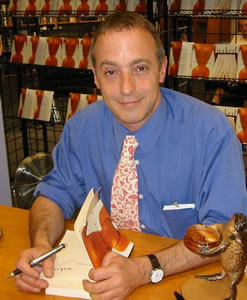
David Sedaris (Binghamton, 26 december 1956)
De Amerikaanse schrijfster Elizabeth Kostova werd geboren op 26 december 1964 in New London, Connecticut. Zij woonde als kind een tijdje met haar ouders in Slovenië. In die periode brachten ze een bezoek aan Amsterdam waar haar vader haar volksverhalen uit de Balkan begon te vertellen. Uit dat bezoek en die verhalen putte ze de inspiratie voor deze roman. Als student reisde Kostova naar Bulgarije om onderzoek te doen naar orale tradities. Die invloed, het vertellen van verhalen, vind je terug in haar boek The Historian.
Uit: The Historian
„In 1972 I was sixteen? young, my father said, to be traveling with him on his diplomatic missions. He preferred to know that I was sitting attentively in class at the International School of Amsterdam; in those days his foundation was based in Amsterdam, and it had been my home for so long that I had nearly forgotten our early life in the United States. It seems peculiar to me now that I should have been so obedient well into my teens, while the rest of my generation was experimenting with drugs and protesting the imperialist war in Vietnam, but I had been raised in a world so sheltered that it makes my adult life in academia look positively adventurous. To begin with, I was motherless, and the care that my father took of me had been deepened by a double sense of responsibility, so that he protected me more completely than he might have otherwise. My mother had died when I was a baby, before my father founded the Center for Peace and Democracy. My father never spoke of her and turned quietly away if I asked questions; I understood very young that this was a topic too painful for him to discuss. Instead, he took excellent care of me himself and provided me with a series of governesses and housekeepers?money was not an object with him where my upbringing was concerned, although we lived simply enough from day to day. The latest of these housekeepers was Mrs. Clay, who took care of our narrow seventeenth-century town house on the Raamgracht, a canal in the heart of the old city. Mrs. Clay let me in after school every day and was a surrogate parent when my father traveled, which was often. She was English, older than my mother would have been, skilled with a feather duster and clumsy with teenagers; sometimes, looking at her too-compassionate, long-toothed face over the dining table, I felt she must be thinking of my mother and I hated her for it. When my father was away, the handsome house echoed. No one could help me with my algebra, no one admired my new coat or told me to come here and give him a hug, or expressed shock over how tall I had grown.“

Elizabeth Kostova (New London, 26 december 1964)
De Amerikaanse schrijver Henry Miller werd geboren op 26 december 1891 In New York. Zie ook mijn blog van 26 december 2006 en ook mijn blog van 26 december 2007 en ook mijn blog van 26 december 2008.
Uit: Tropic Of Capricorn
„I learned, by bitter experience, to hold my tongue; I learned to sit in silence, and even smile, when actually I was foaming at the mouth. I learned to shake hands and say how do you do to all these innocent-looking fiends who were only waiting for me to sit down in order to suck my blood.
How was it possible, when I sat down in the parlour at my prehistoric desk, to use this code language of rape and murder? I was alone in this great hemisphere of violence, but I was not alone as far as the human race was concerned. I was lonely amidst a world of things lit up by phosphorescent flas
hes of cruelty. I was delirious with an energy which could not be unleashed except in the service of death and futility. I could not begin with a full statement – it would have meant the strait-jacket or the electric chair. I was like a man who had been too long incarcerated in a dungeon – I had to feel my way slowly, falteringly, lest I stumble and be run over. I had to accustom myself gradually to the penalties which freedom involves. I had to grow a new epidermis which would protect me from this burning light in the sky.
The ovarian world is the product of a life rhythm. The moment a child is born it becomes part of a world in which there is not only the life rhythm but the death rhythm. The frantic desire to live, to live at any cost, is not a result of the life rhythm in us, but of the death rhythm. There is not only no need to keep alive at any price, but, if life is undesirable, it is absolutely wrong. This keeping oneself alive, out of a blind urge to defeat death, is in itself a means of sowing death. Every one who has not fully accepted life, who is not incrementing life, is helping to fill the world with death. To make the simplest gesture with the hand can convey the utmost sense of life; a word spoken with the whole being can give life. Activity in itself means nothing: it is often a sign of death. By simple external pressure, by force of surroundings and example, by the very climate which activity engenders, one can become part of a monstrous death machine, such as America, for example. What does a dynamo know of life, of peace, of reality? What does any individual American dynamo know of the wisdom and energy, of the life abundant and eternal possessed by a ragged beggar sitting under a tree in the act of meditation? What is energy? What is life? One has only to read the stupid twaddle of the scientific and philosophic textbooks to realize how less than nothing is the wisdom of these energetic Americans. Listen, they had me on the run, these crazy horsepower fiends; in order to break their insane rhythm, their death rhythm, I had to resort to a wavelength which, until I found the proper sustenance in my own bowels, would at least nullify the rhythm they had set up.”

Henry Miller (26 december 1891 – 7 juni 1980)
De Duitse dichter Rainer Malkowski werd geboren op 26 december 1939 in Berlijn-Tempelhof. Zie ook mijn blog van 26 december 2006 en ook mijn blog van 26 december 2007 en ook mijn blog van 26 december 2008.
Uhren
In der Kindheit eine Einmischung.
Fast immer zeigten sie das Ende
von etwas an, selten einen Beginn.
Als ich die erste eigene Uhr bekam,
war ich einen Tag lang stolz.
Dann trug ist sie nicht mehr.
So wehrte ich mich instinktiv
gegen die Vertreibung aus dem Paradies.
Später hielt ich mir viel zugute
auf meine Pünktlichkeit.
Am Handgelenk tickte ein Instrument,
mit dem ich meine Selbstachtung kontrollierte
und den Respekt vor andern.
Auch über Glück und Unglück
entschieden manchmal Minuten.
Aber immer lebte ich in Räumen
ohne hörbaren Stundenschlag.
Ich mied die getäfelten Stuben,
Liebhaber – Museen mit verglasten,
hochkant stehenden Särgen,
in denen ein Perpendikel schwang.
Leichter war mir im Freien.
Die an die Türme geheftete Zeit – beinahe
schon wieder zum Lachen.
Als mein Vater sehr krank war,
schenkte er mir seine Uhr.
Ich dachte: wenn ich sie jeden Tage aufziehe,
wird er nicht sterben.
Und hatte dann doch zu wenig Vertrauen
zu meiner Unvernunft.
Morphin
Wie genau wir das Herz malen:
zwei zusammengewachsene Flügel.
Ohnmächtiges Flattern
bei jedem Aufruhr
in den Körperprovinzen.
Morphin –
und das ruhige,
weiträumige Kreisen
hoch im Blauen.
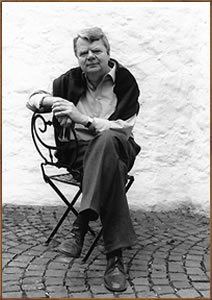
Rainer Malkowski (26 december 1939 – 1 september 2003)
De Duitse schrijver Mani Beckmann werd geboren op 26 december 1965 in Alstätte/Westfalen. Zie ook mijn blog van 26 december 2008.
Uit: Sodom und Gomera
‚Das Flugzeug landete mit einer halben Stunde Verspätung um kurz vor drei Uhr nachmittags auf dem Flughafen Reina Sofia. Noch vor sechs Stunden hatte ich bei elf Grad fröstelnd im Berliner Regen gestanden und auf mein Taxi gewartet, das mich zum Flughafen Tegel bringen sollte, und nun empfing mich strahlender Sonnenschein und eine brütende Hitze auf der Kanareninsel Teneriffa.
»Auf das Wetter ist da unten immer Verlass«, hatte Ute mir versprochen und wie immer recht behalten. »Das Schlimmste, was dir passieren kann, ist der Schirokko. Aber der kommt selten.«
»Aha«, hatte ich geantwortet und nicht recht gewusst, wovon sie sprach.
Ich stand in der Abfertigungshalle und sammelte mein Gepäck ein (wie nicht anders zu erwarten, war es das letzte, das auf dem Förderband erschien). Ich verstaute Jeansjacke und Pullover im Rucksack, setzte meine Sonnenbrille auf, stellte die Armbanduhr um eine Stunde zurück und begann allmählich zu begreifen, dass soeben mein erster längerer Urlaub seit Jahren begonnen hatte. Erst am Vortag hatte ich ein Last-Minute-Pauschalticket erstanden, und noch vor drei Tagen hatte ich nicht die leiseste Ahnung gehabt, dass ich mich an diesem Dienstagnachmittag in der Nähe des 28. Breitengrades auf einer Insel im Atlantischen Ozean befi nden würde. Eigentlich sind spontane Entscheidungen nicht gerade meine Stärke, aber diesmal ging alles ganz plötzlich und erfolgte ohne lange Planung.
Es begann damit, dass Wuttke, mein Redakteur beim »Berliner Abendblatt«, mir bei einer Kulturpreisverleihung am Samstag zu verstehen gab, es sähe in der nächsten Zeit ungünstig mit Aufträgen aus. Er wisse, dass man es als Freiberufl er nicht einfach habe, und es tue ihm ja auch leid, aber so sei es halt im Journalismus. Nicht dass er mit meinen Texten unzufrieden sei, das nun gerade nicht, aber ob ich denn nicht schon einmal überlegt hätte, das Feuilleton aufzugeben und, sagen wir mal, in die Lokalberichterstattung zu wechseln. Im lokalen Sport würden zum Beispiel immer mal wieder patente Leute gebraucht. Eine verbale Ohrfeige durch die Blume!
»Das ist das Sommerloch, da sieht es immer ein wenig mau aus.« Wuttke lächelte unecht. Von wegen Sommerloch! Es war September!“

Mani Beckmann (Alstätte, 26 december 1965)
De Duitse dichter, schrijver en criticus Hans Brinkmann werd geboren op 26 december 1956 in Freiberg in Sachsen. Hij studeerde museumkunde in Leipzig en werkte vervolgens in Schloss Hinterglauchau en later in de stad- en streekbibliotheek in Karl-Marx-Stadt. Hij publiceert sinds 1976.
Uit: Milchmädchen Rechne Dich!
Blutbild einer Fledermaus
Ich habe mir einen Pfahl ins Herz getrieben, bin aber Dracula geblieben. Ich kann das Holz, will ich Blut lecken, rausziehen und dann wieder reinstecken. Alles eine Frage der Disziplin, ein Mann hat sich im Griff oder es hat ihn. Wenn ich mein Herzloch verstöpselt habe, bin ich gemütlich als wie ein Schwabe. Ich esse gute Hausmannskost: Kartoffeln. Sauerkraut, Würstel vom Rost. Ich trinke Tomatensaft, Möhrensaft, Kirsch und manchmal diesen Schnaps mit dem Hirsch. Man sieht, es muss für mich nicht einmal rot sein, das Fleisch auf dem Teller sollte aber tot sein. Hingegen, wenn ich den Pflock rausreiße, kann es schon vorkommen, dass ich beiße. Deshalb bitte ich Abstand zu halten, ihr könnt euch den Moment lang auch woanders entfalten. Schließlich bin ich im Dienst beim Schlürfen, ich mache das für Geld, darf das also dürfen. Ich prüfe im Auftrag der Politik das Blut, wie deutsch, wie süß, wie dick und wie dunkel, ich halte das fest, ist mein Job. Was dann damit wird, mach ich mir keinen Kopp. Ich ahne es freilich, ich bin ja Elite, ein Fachmann von Adel auf meinem Gebiete. Daten werden bundesweit wöchentlich erhoben und – beileibe nicht nur die Ergebnisse meiner Proben werden – erfasst, auch die Rotz- und Wasserbestände; das geht aber alles nicht mehr durch meine Hände. Zweck des Ganzen, soweit ich’ s beurteilen kann, ist die Erforschung der Körperflüssigkeiten, um ihre Nutzung vorzubereiten. Seit nämlich Arbeit kaum noch Gewinn verspricht, sucht die Weltordnung neu nach Gesicht und Gewicht. Nur soviel: Verzicht allein bringt es nicht, wenn’ s der Ökonomie an Profit gebricht.
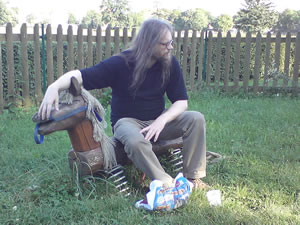
Hans Brinkmann (Freiberg, 26 december 1956)
De Cubaanse schrijver, essayist en musicoloog Alejo Carpentier werd geboren in Havana op 26 december 1904. Carpentier was de zoon van een Russische taallerares en een Franse architect. Op twaalfjarige leeftijd verhuisde hij met zijn familie naar Parijs, waar hij muziektheorie begon te studeren. Bij zijn terugkomst in Cuba, studeerde hij architectuur, een studie die hij nooit af zou maken. Hij begon te werken als journalist en werkte mee met de linkse bewegingen. Hiervoor werd hij een tijd gevangengezet en wanneer hij uit de gevangenis kwam, ging hij in ballingschap naar Frankrijk. Daar werd hij voorgesteld aan de surrealisten, zoals André Breton, Paul Eluard, Louis Aragon, Jacques Prévert en Antonin Artaud. Tijdens zijn verblijf in Frankrijk bezocht hij vele malen Spanje, waar hij de schoonheid van de barok ontdekte die hem vanaf dan zou fascineren. Zijn bekendste werken zijn Ecue-yamba-o!”Alabado sea el Señor” (1933), over de afrocubaanse mythologie en folklore, El reino de este mundo (1949), en Los pasos perdidos (1953). Het was in de proloog van El reino de este mundo, een roman over de Haïtiaanse revolutie, dat hij zijn visie over het “magische realisme” uiteenzette. Van 1945 tot 1959 leefde hij in Venezuela. Na de Cubaanse Revolutie keerde hij terug naar zijn vaderland in 1959, waar hij werkte als directeuur van de Nationale Drukerij en in de Cubaanse ambassade in Frankrijk.
Uit: Journey Back to the Source (Vertaald door Frances Partridge)
“Then the old Negro, who had not stirred, began making strange movements with his stick, whirling it around above a graveyard of paving stones. The white and black marble squares flew to the floors and covered them. Stones leaped up and unerringly filled the gaps in the walls. The nailstudded walnut doors fitted themselves into their frames, while the screws rapidly twisted back into the holes in the hinges. In the dead flower beds, the fragments of tile were lifted by the thrust of growing flowers and joined together, raising a sonorous whirlwind of clay, to fall like rain on the framework of the roof. The house grew, once more assuming its normal proportions, modestly clothed. Ceres became less gray. There were more fish in the fountain. And the gurgling wa
ter summoned forgotten begonias back to life. The old man inserted a key into the lock of the front door and began to open the windows. His heels made a hollow sound. When he lighted the lamps, a yellow tremor ran over the oil paint of the family portraits, and people dressed in black talked softly in all the corridors, to the rhythm of spoons stirring cups of chocolate. Don Marcial, Marqués de Capellanías, lay on his death-bed, his breast blazing with decorations, while four tapers with long beards of melted wax kept guard over him.”
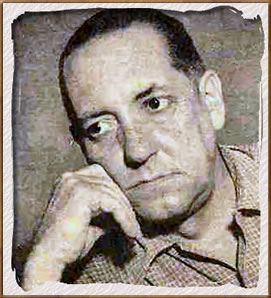
Alejo Carpentier (26 december 1904 – 24 april 1980)
De Amerikaanse dichter en schrijver Jean Toomer werd geboren op 26 december 1894 in Washington, D.C. Hoewel hij gedurende een periode van zijn leven voor blanke doorging groeide hij op in een zwarte gemeenschap. Hij studeerde aan de University of Wisconsin en aan het College of the City of New York. Na zijn studie begon hij te schrijven. In 1921 werd hij leraar in Georgia, het was een reis naar zijn wortels. Vanuit zijn ervaringen in die tijd schreef hij de bundel Cane. Toomer was een prominent vertegenwoordiger van de Harlem renaissance.
Song of the Son
Pour O pour that parting soul in song
O pour it in the sawdust glow of night
Into the velvet pine-smoke air tonight,
And let the valley carry it along.
And let the valley carry it along.
O land and soil, red soil and sweet-gum tree,
So scant of grass, so proligate of pines,
Now hust before an epoch’s sun declines
Thy son, in time, I have returned to thee,
Thy son, I have in time returned to thee.
In time, for though the sun is setting on
A song-lit race of slaves, it has not set;
Though late, O soil, it is not too late yet
To catch thy plaintive soul, leaving, soon gone,
Leaving, to catch thy plaintive soul soon gone.
O Negro slaves, dark purple ripened plums,
Squeezed, and bursting in the pine-wood air,
Passing, before they stripped the old tree bare
One plum was saved for me, one seed becomes
an everlasting song, a singing tree,
Caroling softly souls of slavery,
What they were, and what they are to me,
Caroling softly souls of slavery.
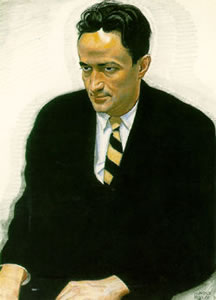
Jean Toomer (26 december 1894 – 30 maart 1967)
Portret door Weinold Reiss
De Nederlandse schrijfster Willy Corsari (pseudoniem van Wilhelmina Angela Douwes-Schmidt) werd geboren in Sint-Pieters-Jette, Brussel, op 26 december 1897. Zij studeerde aan de Toneelschool van Amsterdam, deed mee aan het cabaret aldaar en trad op met grote namen als Jean-Louis Pisuisse en Louis Davids. Deze ervaringen beschreef zij in haar Liedjes en herinneringen. Daarna werd haar schrijverstalent ontdekt, waardoor zij verder ging als populair auteur die een breed publiek wist te bereiken. Haar eerste publicaties verschenen vanaf 1916 in tijdschriften; in 1927 kwam haar eerste boek uit. Haar grootste populariteit bereikte zij in de jaren vijftig. Een aantal van haar boeken is vertaald. Zelf vertaalde ze ook werk van anderen, zoals van Louis Bromfield en Albert Camus.
Willy Corsari was enkele malen gehuwd, en had een verhouding met (onder anderen) Jan Campert. Zij bereikte de respectabele leeftijd van 100 jaar. Haar werk omvat meisjesboeken, romans, detectives (rond inspecteur Lund), korte verhalen, toneelstukken en liedjes.
Liedje in de schemering
Mijn man zingt een oud liefdesliedje
In de schemering na het diner
Mijn vriendin leunt tegen de vleugel
En zingt zachtjes met hem mee
En ik zit in een hoekje gedoken
Mijn hart is zo zwaar van verdriet
Hun stemmen klinken zo aardig saam
’t Is al een heel oud liedje
Veel lange jaren geleden
Toen heb ik dat nog eens gehoord
Toen heeft het mijn hart gestolen
En m’n meisjesrust verstoord
Hij was ook zo knap en innemend
Hij zong, ’t was op een soiree
Ik leunde tegen de vleugel aan
En zong zachtjes met hem mee
Toen kruisten zijn blikken de mijne
En hij zag me zo smekend aan
Dat ik werelden van zaligheid
Voor me open voelde gaan
En al wat een vrouw heeft te geven
Dat gaf ik aan hem maar alleen
Maar sedert die avond vervlogen er
Zo heel vele jaren heen
En ik heb in die jaren ervaren
Dat de liefde gaat snel voorbij
Waarom zingt hij het liedje nu
Dat hij eenmaal zong voor mij
Wat zit je daar, er wordt gesproken
Mijn vriendin lachte luid, te luid
Het licht vlamt op en de schemer is heen
En het liedje is uit, is uit…

Willy Corsari (26 december 1897 – 11 mei 1998)
Zie voor nog meer schrijvers van de 26e december ook mijn vorige blog van vandaag.
